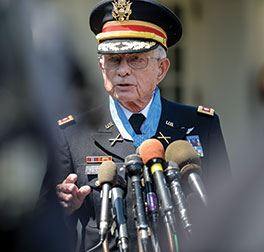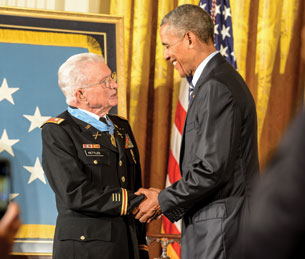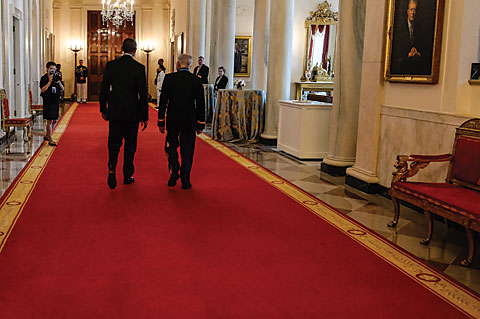 |
||||||||||||
|
September/October 2016
BY WILLIAM C. TRIPLETT Unless you’re a member of Washtenaw County, Michigan, Chapter 310, if you’ve heard of Charlie Kettles it’s more than likely because he was in the national media spotlight this summer when President Obama presented him with a long-overdue Medal of Honor. Otherwise, the soft-spoken Kettles is usually at home with his wife, who suffered a stroke some fifteen years ago. “I’m the primary caregiver,” he said. “I’m limited on how much time I can give outside the house.” Still, fellow chapter members will tell you that Charlie Kettles always manages to give of himself whenever he can, and he always has been modest about it. “He’s a very special person who does not beat his chest for anything,” said former Chapter 310 President John Kinzinger. ----
As chapter member Vance McCrumb said about meeting Kettles long ago, “I was impressed by how humble he was, and still is.” Indeed. About four years ago, Bill Vollano, assistant historian for the chapter, met Kettles to interview him for the Veterans History Project, a national effort started in 2000 to record the experiences of wartime veterans and store them at the Library of Congress. During the interview, Kettles talked in general terms about his overall time as a helicopter pilot in Vietnam. “After a while my wife said, ‘Tell him about 15 May,’ And after about the third time she said that, Bill asked, ‘What’s this about 15 May?’ So I told him,” Kettles said. Twice that day Kettles led a flight of Hueys carrying reinforcements into a hot LZ where roughly 120 men of the 1st Brigade/101st Airborne were trying to hold off a battalion-size NVA force. After landing amid heavy fire, one of the helicopters was hit by a mortar round; the crew escaped. While taking on wounded, the choppers were raked by automatic weapons. Kettles’s ship leaked fuel as it lifted off. After returning to base, Kettles learned that forty remaining soldiers, along with the four crewmen of the destroyed Huey, needed emergency extraction. With the support of gunships, Kettles led another flight of six helicopters back into enemy fire, loaded everyone up, and flew out. Minutes later, though, word came that eight men were still on the ground—they hadn’t been able to reach the extraction point because of intense fire. Kettles swung his bird around to go back in—alone, without gunship support. As the eight men scrambled aboard, a mortar round “went off on the snoot of the aircraft,” Kettles said. Both windshields were blown out, a main rotor and the tail boom were damaged, and shrapnel hit some of the passengers. The barely flyable, overloaded helicopter began to fishtail violently immediately after leaving the ground. A man had almost fallen out and was clinging to a skid; his buddies pulled him back in. Then the helicopter failed to sustain a hover. Kettles improvised a “modified running takeoff and we departed,” he said. “That was it.”
Was Kettles glad to receive it? “What we need to remember is that there were some seventy-four helicopter crew members involved that day,” he said, “so the medal really belongs to the seventy-four.” People who know Charlie Kettles wouldn’t be surprised to hear him say that. According to Kinzinger, Kettles quietly volunteered to pay for the upkeep of the local Vietnam Veterans memorial, and, with his son, made sure the chapter received thousands of cardboard boxes at no cost to send goods to troops overseas. He also has participated in a program the chapter devised for bringing VVA members into high school history classes to talk about their war experiences. True to form, Kettles doesn’t talk about 15 May unless prompted. That, too, is perhaps no surprise, given Charlie Kettles’s ultimate summation of that day: “The really important thing is we got forty-four men whose names are not written on The Wall. At least not for that action. That’s about all that really counts.”
|
||||||||||||
|
|
||||||||||||
|
||||||||||||
8719 Colesville Road, Suite 100, Silver Spring. MD 20910 | www.vva.org | contact us |
||||||||||||






















 It appears that if it weren’t for others, Kettles probably wouldn’t talk much about his experiences on May 15, 1967, when at great peril he led a rescue mission that saved the lives of forty-four men in Duc Pho, north of Qui Nhon. That mission eventually led to two medals that Kettles himself never pursued.
It appears that if it weren’t for others, Kettles probably wouldn’t talk much about his experiences on May 15, 1967, when at great peril he led a rescue mission that saved the lives of forty-four men in Duc Pho, north of Qui Nhon. That mission eventually led to two medals that Kettles himself never pursued. The Army awarded the Distinguished Service Cross to Kettles, who had no idea it was coming. Vollano, who has interviewed some 150 veterans for the VHP, suspected that the DSC was inadequate recognition. He tracked down some of the men who’d been involved, and they confirmed the account. Vollano then contacted his member of Congress, saying he thought Kettles deserved consideration for the highest military award, the Medal of Honor, and the process got underway. Everything culminated in July with the presentation ceremony at the White House.
The Army awarded the Distinguished Service Cross to Kettles, who had no idea it was coming. Vollano, who has interviewed some 150 veterans for the VHP, suspected that the DSC was inadequate recognition. He tracked down some of the men who’d been involved, and they confirmed the account. Vollano then contacted his member of Congress, saying he thought Kettles deserved consideration for the highest military award, the Medal of Honor, and the process got underway. Everything culminated in July with the presentation ceremony at the White House.